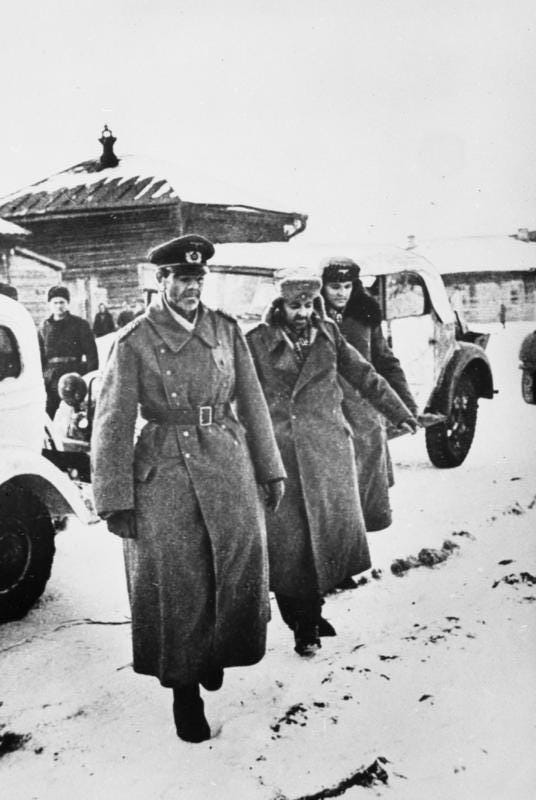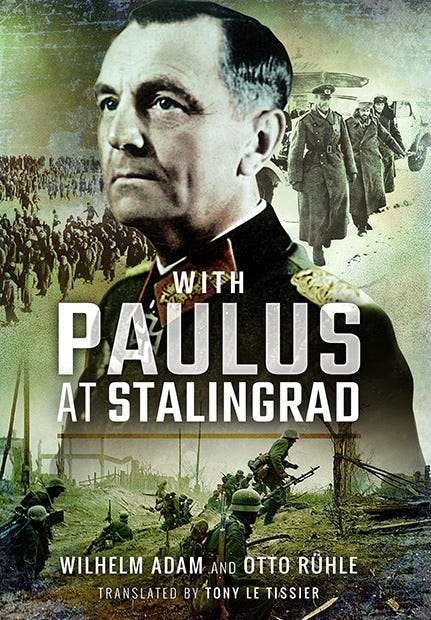With Paulus at Stalingrad
An excerpt from the inside story of Stalingrad by the Staff Officer who watched the disaster unfold.

Wilhelm Adam travelled a long way during 1942. As senior ADC to General Paulus, commanding the 6th Army, he had been privy to all the planning and preparation for Hitler’s new summer offensive - Fall Blau. He had a realistic perception of the ambitious task before them - his appreciation was they were being asked to advance on a front that would previously have been given to two or three armies.
Before us lay the extensive Don Steppe. The July sun burned mercilessly out of an azure blue sky on the dust-covered marching columns. There were no proper roads here, no trees or bushes to give shade, no springs to quench the burning thirst. Wherever the eye looked, one saw only steppe grass and wormwood with legions of ground squirrels in between.
Six months later things looked very different indeed. Although 6th Army had reached Stalingrad, they were merely being sucked deeper and deeper into a disaster. With Paulus at Stalingrad tells that story in considerable detail, the various personalities involved, the communications with Fuhrer HQ, the grinding inevitability of a nightmare unfolding - with graphic descriptions of the suffering of the German troops.
The following excerpt covers the last two days in Stalingrad as Adam began to have doubts about the Chief of Staff to the 6th Army, Lieutenant-General Schmidt:
Was Lieutenant-General Schmidt playing a double game?
In these last days Schmidt also developed a lively busy-ness in other respects. Thus he ordered Colonel von Beaulieu, commander of an infantry regiment of the 3rd (Motorised) Infantry Division, to see him. This man, who had spent a long time in the Soviet Union during the 1920s, spoke the Russian language, knew the country and the people and - as he stressed - was familiar with the Red Army.
I had met him frequently since the beginning of the Eastern Campaign. Astonished, I greeted him as he left the chief of staff’s room. ‘Schmidt had me tell him about the Russian Army. He was particularly interested in the question of what one could expect from their soldiers and officers. I had no idea that your chief of staff could be so friendly.’
Likewise, the interpreter of the List Corps was repeatedly called to headquarters to report to Schmidt. He was a Czarist emigrant, a former landlord and ensign in the Czarist Army. With him too Schmidt discussed the land and the people, and the soldiers and officers of the Red Army.
What was causing the chief of staff to have these discussions? Could it be a preparation for captivity? Was he playing a double game? Already he had instructed Roske to prepare the department store for all-round defence - was he also preparing himself for captivity?
It was late evening on the 29th January, and I was walking in the dark passages of the cellars when someone tugged my sleeve. I thought at first that it must be one of the wounded, who had sought shelter here in the last few days. But by the light of my pocket torch, I recognised Schmidt’s orderly. The general himself was with Roske, discussing defensive measures for the headquarters.
The senior corporal led me into Schmidt’s living room and pointed to a corner where a little suitcase stood. When he opened it, I bent down and then looked at the soldier in surprise. Then he said smiling: He orders all his subordinates to hold on, surrender being out of the question, while he himself is equipped for captivity.’
I thanked him for this very informative exposure and went to my room. So that is what it was all about. Schmidt was not applying to himself the order to fight to the last man. Paulus shook his head as he heard my observations. ‘I would never have thought it possible. The man who has been spreading the rumours about prisoners being shot in the head carefully informs himself about the expected handling by the Red Army. He is reckoning on captivity but lets no one else know about it.’
‘Schmidt was never my friend, but I took him to be consistent in his ways. But in the last few days he has shown his true self. His words and deeds are incompatible. It’s a pity that you took his advice, Colonel-General.’ ‘Now it is too late to talk about it. We have reached the end. Perhaps another chief of staff from the general staff would have helped to make better decisions. But let us leave it.’
Suicide or captivity?
Yes, the end was near. A comprehensive defensive position was no longer available. There were now only strongpoints that could be defended by battle groups. Such a strongpoint stood opposite the department store near the Zaritza, which had already been crossed by the Red Army. It was occupied by Colonel Ludwig’s battle group, for which the remains of the 14th Panzer Division were grouped as the army’s reserve.
The battle group had set itself up in the ruins of a shop. On the ground and first floors the window spaces had been barricaded with sandbags and bricks. This was now the forward position. The Red Army was already sitting in the Gorki Theatre opposite. Colonel Ludwig regarded this as the last line of defence before the last ‘headquarters’. The building was already under direct fire from the enemy’s infantry weapons. To the west of us the red-starred tanks were only a few streets away. We really were coming to the end!
Before us now stood the question: suicide or captivity? While Paulus had previously dismissed the notion of suicide, he now began to waver.
After a long deliberation he said concernedly: ‘Hitler expects especially from me that I commit suicide. What do you think about that, Adam?’ I was angry: ‘Until now we have tried to prevent suicide in the army. This is and remains the right thing to do. You too have to share the fate of your soldiers. Should a shell hit our cellar, then we are dead. I would, however, regard it as shameful and cowardly should we end our lives by suicide.’
Paulus seemed to be freed from pressure by my words. He basically thought the same as I did, but wanted to check the consequences of my argument once more. That was his way of doing things.
Lying glorification
Paulus’s silence was now at an end. He began to recount his experiences and events in the Fuhrer Headquarters. As deputy chief of staff of the army, subordinate to Colonel-General Halder, Paulus had witnessed many of Hitler’s outbursts of rage. In his presentations, Halder hardly ever got beyond his first sentence before Hitler overwhelmed him with words and went on talking.
Paulus described how Hitler’s greatest delusion was strongly reinforced by those subservient, praising people around him, with Field Marshal Keitel in the forefront. In the main, as seen through these accounts, Hitler’s role and character stood out flashily and naked, and it was barely understandable, even unpardonable, that a person with such intimate knowledge of him had continued to be a follower.
This was the 30th January 1943, the tenth anniversary of Hitler’s ‘seizure of power’.
Schmidt had prepared two radio messages to Hitler, which Paulus had signed unaltered. The first read:
The 6th Army has, faithful to its oath of allegiance, in view of its high and important task, held its position to the last man and the last bullet for Fuhrer and Fatherland. Paulus.
The second radio message included best wishes for the 30th January:
On the anniversary of your seizure of power, the 6th Army congratulates its Fuhrer. The swastika still flies over Stalingrad. Our battle has given the living and coming generations an example, also in the hopelessness of never surrendering, that Germany will win.
Heil mein Fuhrer
Paulus, Col-Gen.
Was that not a mockery of the 6th Army’s dreadful fate? Army headquarters could not have done Goebbels, as Reichs Propaganda Minister, a greater service. This radio message gave him an opportunity to glorify the senseless deaths.
Hitler replied immediately:
My Colonel-General Paulus! Already today the whole German people look upon this city with deep emotion. As always in world history, this sacrifice will not be in vain. The creed of von Clausewitz will find its fulfilment. The German nation now understands the whole difficulty of this battle and will make the greatest sacrifice. With thanks to you and your soldiers,
Your Adolf Hitler
This excerpt from With Paulus at Stalingrad appears by kind permission of Pen & Sword Books Ltd. Copyright remains with the author.


